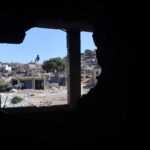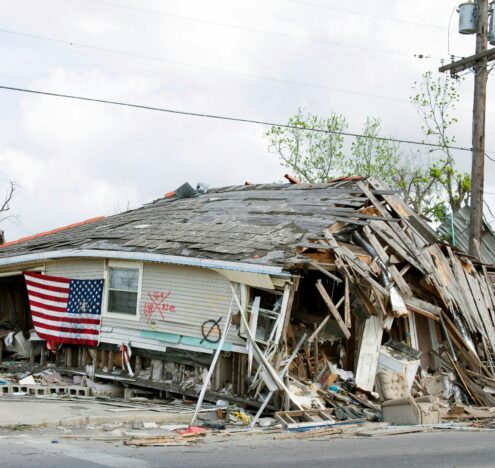Like much of the world right now, I have been following the news from Ukraine daily. And like so many, I am heartbroken to see the devastation there. As I scroll through headlines, however, there is a dissonant feeling lurking in the background: outrage.
I’m American, but for the past four years, I have lived in a refugee community in Turkey. The people I work with, go to church with, and buy my bread from — and the person I now share a last name and two children with — all came to Turkey as refugees from Iraq and Syria. The world has not opened its arms to them. Instead of compassion, they have received disdain. Instead of open doors, they have faced walls, bans, red tape, and even bullets. Some have risked their lives and paid hundreds or thousands of dollars to hire smugglers to get them to Europe. Others have taken their chances and gone back to their countries, but most remain in Turkey, trying to start a new life while facing discrimination, exploitation, and hardship.
I have read heartwarming stories of civilians in Hungary greeting Ukrainian refugees with smiles and hot meals. In Poland, a celebrity chef volunteered to distribute meals at the border. “Obviously all the people of Poland, like all the people of the world, are Ukrainians right now,” he said. By contrast, in 2016, when the refugees in question were largely from Middle Eastern countries, a poll showed Hungary and Poland had the highest number of people who believed refugees would increase the likelihood of terrorism in their country. In 2018, 54% of Hungarians said they would oppose taking in refugees fleeing violence and war.
This narrative is playing out all across Europe. Greece has offered one-year protection status to Ukrainians and even offered them job opportunities in the tourism sector. When boats of Syrians arrived on Greece’s shores in 2013, they were simply turned away, sometimes with fatal results. And this contradiction is not just limited to Europe. When I log onto my social media and see my American friends’ posts, it’s a wash of yellow and blue, “pray for Ukraine” banners and messages about practical ways to help from the States. I don’t remember seeing any of this when Syria’s totalitarian government — backed by the very same Russia — began killing its own civilians in 2011.
It seems with Ukraine the Western world now magically understands the truth about refugees: Refugees are the ones fleeing violence and war, not the ones perpetuating it.
The speed and depth of the response to Ukrainian refugees that I’m seeing illustrates how previous arguments about resource scarcity and security concerns were just veils for racism and Islamophobia. The tools for welcoming refugees have been there all along, yet we have not seen this kind of widespread empathy and compassion for refugees until those refugees were European, Christian and, largely, white. It seems with Ukraine the Western world now magically understands the truth about refugees: Refugees are the ones fleeing violence and war, not the ones perpetuating it. They are not inherently dangerous or threatening. Anyone could be a refugee; and that includes you and me.
As it turns out, it’s not refugees that people reject. It’s Middle Eastern refugees. It’s dark-skinned refugees. It’s Muslim refugees.
My husband is from Aleppo, Syria. We got married in Turkey in 2018 during the heart of the Trump administration when the doors were sealed to Syrians. He knows what it feels like to be unwanted. In the height of their need, Syrian refugees were simply given a “no.” Even after the change of administration, the proposed quota for refugees from all of the Middle East and South Asia remains a meager 35,000.
The war in Syria has fallen out of the news, but refugees continue to pour out of Syria daily. The world has come to expect conflict in the Middle East; we are used to images of Syrians fleeing violence. It seems normal, but it is not normal. My friends and family who are refugees are reminded every day of their lives of this fact. “They expect us to just pause our lives and wait,” my Iraqi friend, who has been in Turkey awaiting resettlement for eight years, told me. This reality has now become part of my own story as my husband and I try to navigate the world with his refugee status, searching for a place we and our children can live together permanently.
It’s normal to identify most with people who are similar to you. But that should not determine who gets protected and who gets left in limbo. Reasons journalists have given for their heightened empathy for Ukrainian refugees have been that unlike other refugees, Ukrainians are educated and “civilized,” “watch Netflix and have Instagram accounts,” and are “middle class.” These assumptions are not only classist and discriminatory, they are also false. “There are people in Syria who are way more educated than some people in Ukraine,” my husband fumed. “All of my friends who [fled] to Germany are studying to become engineers, doctors, and IT experts now, how are we ‘not educated?’”
I suspect this assumption has much to do with how the media has depicted Syrians. In pictures and stories, Syrians are largely portrayed as helpless and almost primitive. In my experience, Syrians have been some of the smartest, most resourceful, and most hardworking people I’ve ever met. The real question is, when did education status and degree of similarity to Western culture become a deciding factor in who gets protected and who gets left to die?
I understand that not all refugee situations are the same and that the politics and history surrounding each country’s relationship with another are different. But there is one thing that never changes: People fleeing war need a safe place to go. No matter who they are or where they’re from.
I am glad people’s hearts are stirred by the crisis in Ukraine. I hope this empathy for what Ukraine is experiencing opens people’s eyes to the millions of others facing this situation around the globe. I hope this challenges people’s assumption of who a refugee is and what it means to be one. But to be honest, my expectations are low. The world has made it clear that some people matter more than others.
It’s time to end this selective compassion. Eligibility for asylum and the ability to find a safe place to be should never rely on who we think is deserving and who is not. It’s time nations see need for need and stop letting their own fears and biases overshadow that. This is not a competition. It is a crisis.
Emilie Osman studied Global Development at University of Virginia with a concentration on the Middle East and methods of refugee aid. Since 2018 she has been working on a refugee-led team serving Syrians in Turkey.




















